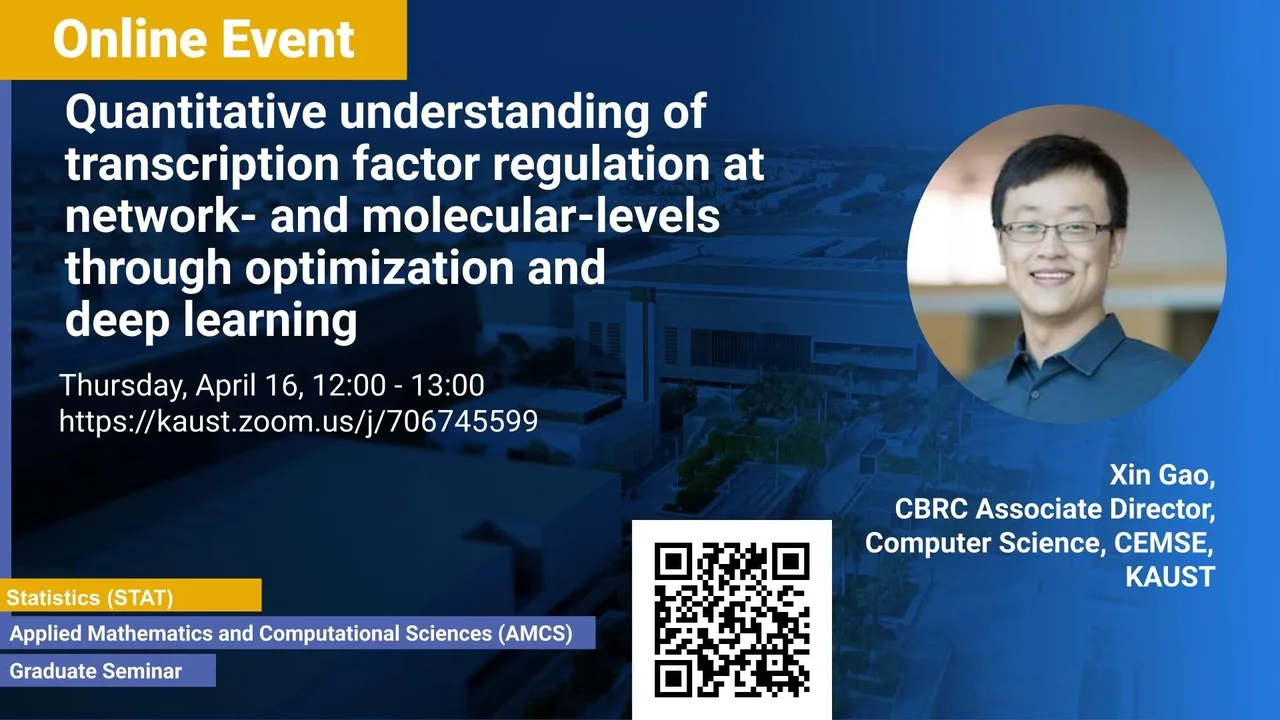
Quantitative understanding of transcription factor regulation at network- and molecular-levels through optimization and deep learning
Transcription factors are an important family of proteins that control the transcription rate from DNAs to messenger RNAs through the binding to specific DNA sequences. Transcription factor regulation is thus fundamental to understanding not only the system-level behaviors of gene regulatory networks, but also the molecular mechanisms underpinning endogenous gene regulation. In this talk, I will introduce our efforts on developing novel optimization and deep learning methods to quantitatively understanding transcription factor regulation at network- and molecular-levels. Specifically, I will talk about how we estimate the kinetic parameters from sparse time-series readout of gene circuit models, and how we model the relationship between the transcription factor binding sites and their binding affinities.
Overview
Abstract
Transcription factors are an important family of proteins that control the transcription rate from DNAs to messenger RNAs through the binding to specific DNA sequences. Transcription factor regulation is thus fundamental to understanding not only the system-level behaviors of gene regulatory networks, but also the molecular mechanisms underpinning endogenous gene regulation. In this talk, I will introduce our efforts on developing novel optimization and deep learning methods to quantitatively understanding transcription factor regulation at network- and molecular-levels. Specifically, I will talk about how we estimate the kinetic parameters from sparse time-series readout of gene circuit models, and how we model the relationship between the transcription factor binding sites and their binding affinities.
Brief Biography
Dr. Xin Gao is an associate professor of computer science at KAUST. He is also the Acting Associate Director of the Computational Bioscience Research Center and the lead of the Structural and Functional Bioinformatics Group at KAUST. Prior to joining KAUST, he was a Lane Fellow at Lane Center for Computational Biology in School of Computer Science at Carnegie Mellon University. He earned his bachelor degree in Computer Science in 2004 from Tsinghua University and his Ph.D. degree in Computer Science in 2009 from University of Waterloo. Dr. Gao’s research interest lies at the intersection between computer science and biology. In the field of computer science, he is interested in developing machine learning theories and methodologies related to deep learning, probabilistic graphical models, kernel methods and matrix factorization. In the field of bioinformatics, his group works on building computational models, developing machine learning techniques, and designing efficient and effective algorithms to tackle key open problems along the path from biological sequence analysis, to 3D structure determination, to function annotation, to understanding and controlling molecular behaviors in complex biological networks, and, recently, to biomedicine and healthcare. He has published more than 190 papers in the fields of bioinformatics and machine learning. He is the associate editor of Genomics, Proteomics & Bioinformatics, BMC Bioinformatics, and Quantitative Biology, and the guest editor-in-chief of IEEE/ACM Transactions on Computational Biology and Bioinformatics, Methods, and Frontiers in Genetics.
